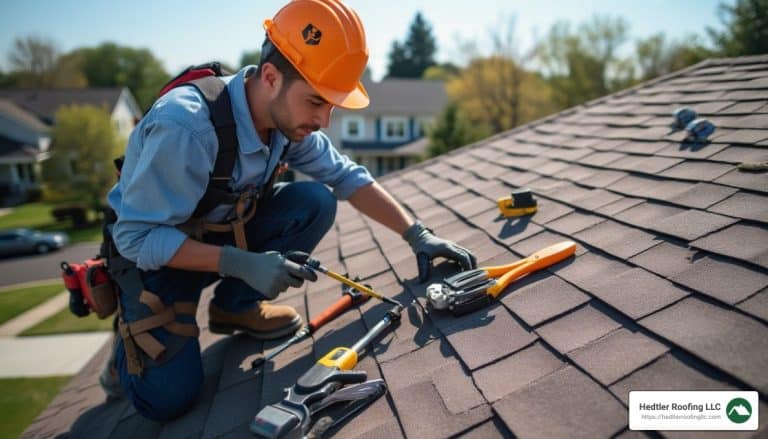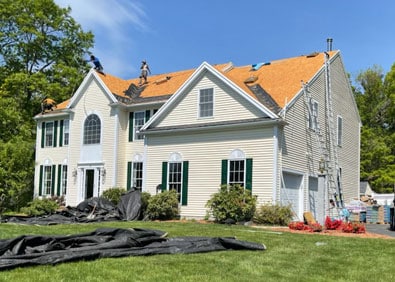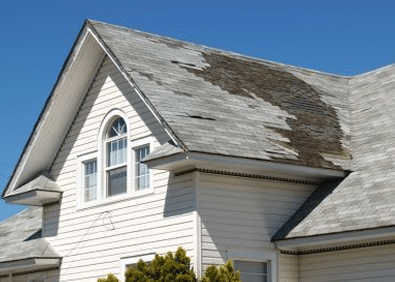
How often should you have your roof inspected? Regular roof inspections are crucial for maintaining the durability and safety of your home, especially considering Franklin and Bellingham, MA’s unpredictable weather. Most experts recommend inspecting your roof at least once every two years. For older roofs or those subjected to harsh weather conditions like heavy winds or snow, annual inspections are wise. After major storms or if your roof is over 20 years old, consider even more frequent checks to ensure optimal performance and weather protection.
Your roof is one of the most vital components of your home. It guards against the elements and maintains the structural integrity of your dwelling. Regular inspections are essential to catch small problems before they escalate, saving both time and money. Think of your roof as your home’s first line of defense against Massachusetts’ unpredictable weather patterns, like those experienced in Franklin or Bellingham. Beyond aesthetics, a well-maintained roof ensures safety and warmth through every season.
I’m Jason Hedtler, owner of Roof Experts, and I’m dedicated to helping Massachusetts homeowners understand how often you should have your roof inspected. With experience in providing quality roofing services, I’m here to ensure your roof remains durable and reliable. Stick around to find why regular inspections are not just recommended but necessary for safeguarding your home and investment.
How often should you have your roof inspected terms you need:
– Regular Roof Inspections
– roofing inspection
– roof inspection checklist
Regular roof inspections are a cornerstone of preventive maintenance. They help identify issues early, before they turn into costly repairs. Imagine catching a small leak before it becomes a waterfall in your living room. That’s the power of a timely inspection.
Insurance requirements also play a role. Many insurance policies mandate regular roof inspections to maintain coverage. Without them, you might find yourself without financial protection after a storm damages your roof. Insurance companies appreciate proactive homeowners who maintain their roofs, which can sometimes result in better rates.
Early problem detection is key. Inspections can spot leaks, damaged shingles, or faulty flashing. For example, a Massachusetts homeowner found a small leak during a routine inspection. Left unchecked, it could have led to extensive water damage and mold growth. Early detection saved them thousands in repairs.
In Massachusetts, the weather can be unpredictable. From heavy snowfall to strong winds, your roof takes a beating. This makes regular inspections even more crucial. They ensure your roof is ready to face whatever Mother Nature throws its way.
Whether it’s preventive maintenance, meeting insurance requirements, or ensuring early problem detection, regular roof inspections are indispensable. They keep your roof in top shape, ready to protect your home through every season.
Next, let’s explore how often you should have your roof inspected based on factors like age, material, and local weather conditions.
Determining how often should you have your roof inspected involves several factors. These include the age of your roof, the materials it’s made from, and the local weather conditions in Massachusetts.
Roof Age:
Older roofs need more frequent inspections. If your roof is over 10 years old, consider having it checked every three years. For roofs older than 20 years, annual inspections are wise. As roofs age, they become more vulnerable to damage, making regular checks essential.
Roofing Material:
Different materials have different lifespans and maintenance needs. Asphalt shingles, the most common type in Massachusetts, generally require inspections every two years. Metal roofs, known for their durability, might only need inspections every three to five years. However, if you have a flat roof, consider annual inspections to catch potential water pooling issues early.
Weather Conditions:
Massachusetts weather is a major factor. Heavy snowfall, rain, and strong winds can all take a toll on your roof. After severe weather events, such as nor’easters, it’s smart to schedule an inspection to catch any immediate damage.
Heavy Rainfall and High Winds:
Areas prone to heavy rainfall and high winds require more frequent inspections. These conditions can lead to leaks, missing shingles, or damaged flashing. Inspecting your roof after significant storms helps identify and address these issues before they escalate.
Overhanging Trees:
Trees near your home can drop leaves, branches, and other debris onto your roof. This debris can trap moisture, leading to mold or rot. If your home is surrounded by trees, schedule inspections more often to ensure your roof stays clear and in good condition.
Regular inspections, custom to these factors, ensure your roof remains in excellent shape. By understanding and addressing the unique needs of your roof, you protect your home and your investment.
Next, let’s look at what happens during a roof inspection and what professionals typically check for.
A roof inspection is a thorough examination of your roof’s condition. It’s more than just a quick glance—it’s a detailed assessment to catch any potential issues before they become major problems.
During a roof inspection, the first step is a damage assessment. The inspector will check for any visible signs of wear and tear. This includes looking for missing or damaged shingles, signs of water damage, and any structural issues. They will also check for sagging areas or any spots where the roof might be vulnerable to leaks.
Inspectors pay close attention to shingles and flashing. Shingles protect your roof from the elements, and any missing or damaged ones can lead to leaks. Flashing, the metal pieces that cover joints and seams, is also crucial. If flashing is loose or damaged, it can allow water to seep into your home. Inspectors will ensure that all shingles and flashing are intact and properly installed.
After the inspection, you receive a detailed report. This report outlines any issues found during the inspection and provides recommendations for repairs. It includes photos and descriptions of problem areas, helping you understand the current state of your roof. The report also offers an estimate for repair costs and advice on extending your roof’s lifespan.
By regularly scheduling roof inspections, you gain peace of mind knowing your roof is well-maintained. This proactive approach helps prevent costly repairs and ensures your home remains safe and protected from the elements.
Next, we’ll explore the costs associated with roof inspections and how investing in regular checks can save you money in the long run.
When considering how often you should have your roof inspected, understanding the costs involved is essential. Knowing what to expect financially can help you plan and budget for this crucial maintenance task.
The cost of a roof inspection can vary based on several factors like the size and complexity of your roof. Typically, a general roof inspection costs between $120 and $400. Factors such as roof accessibility and the level of detail required in the inspection can influence the price.
Many roofing companies offer maintenance programs that include regular inspections. Signing up for one of these programs can be cost-effective. Instead of paying for each individual inspection, a maintenance program often provides annual (or even semi-annual) inspections at a reduced rate. These programs may also include additional perks like discounted repair rates and gutter cleaning.
Investing in regular roof inspections is a smart financial move. Catching minor issues early can prevent them from becoming major problems, saving you hundreds or even thousands of dollars in repair costs. For example, a simple cracked pipe boot might be a cheap fix now, but if left unchecked, it could lead to significant water damage.
By addressing these small issues promptly, you extend the life of your roof, delaying the need for a costly replacement. In this way, spending a little on inspections can save a lot in the long term.
In the next section, we’ll address some frequently asked questions about roof inspections, helping you understand their importance and how they contribute to the longevity of your roof.
The primary goal of a roof inspection is to extend the roof’s lifespan and prevent costly damage. By identifying potential issues early, such as leaks or weak spots, homeowners can address problems before they escalate. Leak detection is crucial, as unnoticed leaks can lead to water damage, mold growth, and structural issues. Regular inspections help ensure that your roof remains in optimal condition, safeguarding your home against the elements.
Cleaning your roof is essential to maintain its health and appearance. Moss and algae can accumulate, especially in damp climates, causing damage over time. It’s generally recommended to clean your roof annually to prevent these growths. Regular cleaning not only improves your roof’s aesthetics but also helps prevent moisture retention, which can lead to rot and decay. If your roof is prone to moss or algae, consider scheduling more frequent cleanings.
Detecting roof damage early can save you from expensive repairs. Here are some signs to watch for:
If you notice any of these signs, it’s time to call a professional for an inspection. Regular checks ensure that minor issues are caught early, keeping your roof—and your home—safe and sound.
At Roof Experts, we understand the unique challenges Massachusetts homeowners face when it comes to maintaining their roofs. With over 20 years of experience in the Bellingham and Franklin areas, we have honed our skills in providing high-quality roof inspections that are both thorough and reliable.
Regular roof inspections are not just a recommendation; they’re a necessity for ensuring your home’s safety and longevity. Our professional inspections help identify and address potential problems before they become costly repairs. We focus on value and detailed assessments to give you peace of mind knowing your roof is in capable hands.
Massachusetts weather can be unpredictable, with heavy snowfall, rain, and strong winds. These conditions can accelerate wear and tear on your roof, making regular inspections even more critical. By partnering with us, you ensure that your roof is ready to withstand whatever Mother Nature throws your way.
Don’t wait until it’s too late. Schedule your next roof inspection with Roof Experts today. Visit our service page to learn more about how we can help keep your roof in peak condition. Your home deserves the best, and we’re here to provide it.

Roof Installations

Roof Replacements

Roof Repairs